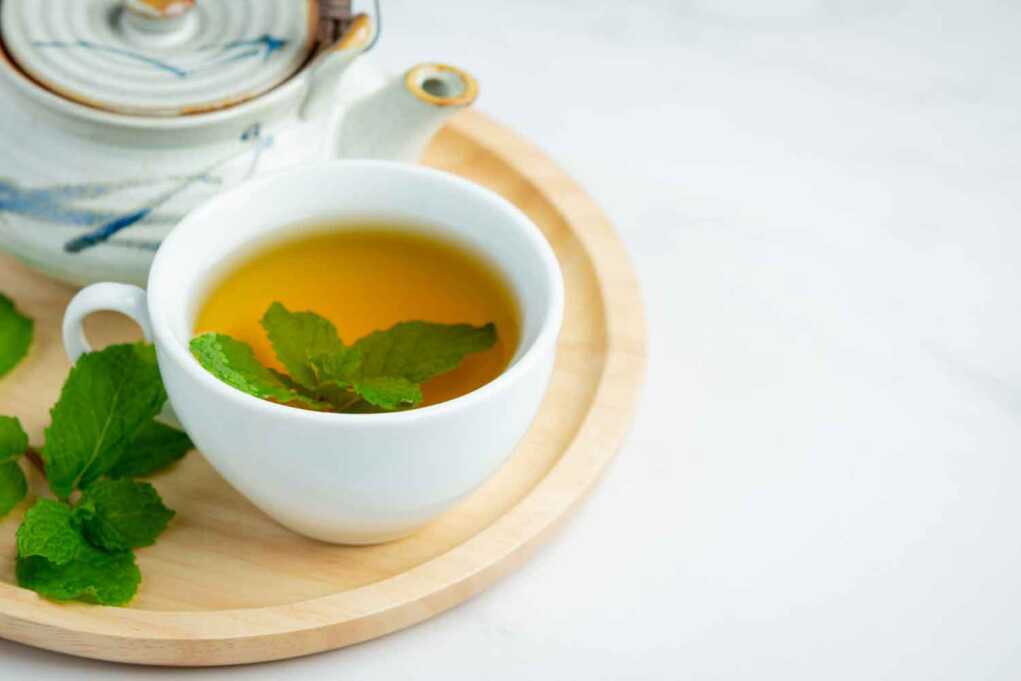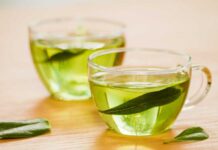
This subtly minty beverage can help balance hormones and loosen stiff joints.
When choosing gum or mints, deciding between peppermint and spearmint often depends on taste. Peppermint has more menthol and a highly intense flavor, while the taste of spearmint is subtle and sweeter.
But when choosing tea, there’s more to consider than just flavor. Different teas offer distinct health benefits — and spearmint tea brings a lot to the table.
“The best thing about tea is that it’s affordable, readily available and easy to make,” says registered dietitian Natalie Romito, RDN, LD. “That means anyone can enjoy the benefits of spearmint tea.”
Spearmint (Mentha spicata), like peppermint, is a type of mint. The concentrated forms of different kinds of mint may offer similar health benefits. But spearmint leaves have unique health benefits that make its tea stand out.
Romito shares what you need to know about your soothing cup of spearmint tea.
Is Spearmint Tea Good For You?
Spearmint tea is naturally sugar-free and doesn’t contain caffeine. It can help you stay hydrated and provides a healthy, flavorful alternative to water.
Fresh spearmint contains vitamins and vital nutrients but only in small amounts — it would be hard to get the recommended daily amount from spearmint tea alone. But spearmint tea contains antioxidants, which protect the cells from damage due to free radicals.
Spearmint tea is an excellent source of:
- Flavonoids, such as flavanones and flavones, which boast antioxidant properties.
- Rosmarinic acid, a compound that provides powerful antioxidant and anti-inflammatory benefits.
“Black tea is known to be high in antioxidants. But if you don’t like the taste of black tea, spearmint tea is a great alternative and has a comparable number of antioxidants,” Romito says. “And all teas help lower inflammation and reduce the risk of numerous diseases, including cancer, diabetes and heart disease.”
How Spearmint Tea Can Boost Your Health
Experts haven’t studied the benefits of spearmint tea as widely as the health benefits of other types of tea. But research related to a few specific health conditions is promising.
To gain the benefits of spearmint tea, Romito says it’s important to pay attention to the amount of tea needed to get that benefit.
“A lot of the studies for spearmint tea used 5 grams of tea a day, equivalent to three or four standard tea bags,” she says. “Measure loose-leaf tea in grams using a food scale.”
What can spearmint tea help with?
-
Improves hormonal imbalance associated with PCOS
As many as 5 million women and people assigned female at birth (AFAB) in the United States live with polycystic ovary syndrome (PCOS) — a condition marked by severe hormonal imbalance. People with PCOS typically have:
- High levels of androgens, a group of male sex hormones that includes testosterone.
- Low levels of luteinizing hormone (LH) and follicle-stimulating hormone (FSH), the hormones responsible for sexual function.
“Multiple studies have shown that spearmint tea can benefit people AFAB who have a hormonal imbalance due to PCOS,” Romito says. “It helps bring testosterone levels back into the normal range, which may improve some of the symptoms associated with high testosterone.”
In one study, people with PCOS drank spearmint tea twice a day. After a month, they had lower levels of testosterone and higher levels of LH and FSH compared with participants who drank placebo tea.
But you may see results sooner than that. In another study, people with hormonal imbalances saw improvement after just five days of drinking spearmint tea.
“The benefit likely depends on how far out of normal range your numbers are,” Romito says. “If your testosterone levels are a little high, the tea may be enough. If they are very high, you may need additional medication to see improvement.”
-
Helps with excessive hair growth
Some people AFAB experience excessive hair growth (hirsutism). The dark, coarse hair typically grows on their face, breasts and stomach.
Approximately 5% to 10% of people AFAB of reproductive age experience hirsutism. It can be a side effect of some medications and a symptom of other conditions. But half of those who have it also have excess male hormones. The extra hormones overstimulate hair follicles.
“One of the symptoms of PCOS and hormonal imbalance can be excessive hair growth,” Romito shares. “But that symptom decreases and even goes away when you lower the testosterone level.”
Spearmint tea can help. In the same study that found drinking spearmint tea lowers testosterone, participants also reported reduced hirsutism.
-
Improves joint stiffness
One of the antioxidants in spearmint tea, rosmarinic acid, provides powerful benefits for joint pain and stiffness. Research shows that people with osteoarthritis who drank spearmint tea containing a high level of rosmarinic acid significantly reduced their joint pain and stiffness.
But your joints will benefit even if you don’t have access to tea high in rosmarinic acid. Study participants who drank generic spearmint tea purchased at their local supermarket found that their joint stiffness greatly improved.
Other Possible Benefits Of Spearmint
While there’s limited research on spearmint tea, experts have found other possible health benefits associated with spearmint extract and essential oils.
“Essential oils and extracts can be more concentrated, which can change the impact on your body,” Romito notes. “With humans specifically, studies looking at essential oils are very different from studies focusing on teas.”
The research on spearmint extract and essential oils — which includes both human and animal studies — finds that those substances may help:
- Fight bacterial infection.
- Improve nausea and stomach upset.
- Improve memory.
- Lower blood pressure.
- Lower blood sugar.
Additionally, spearmint may provide some of the same benefits as mint — both part of the Mentha plant family. But at this point, there isn’t enough research to be sure.
Is It Good To Drink Spearmint Tea Every Day?
Experts find minimal risks associated with drinking spearmint tea. For most people, it’s OK to have multiple cups daily.
But some people should be careful about how much spearmint tea they drink. Children and people who are pregnant should consult their healthcare provider, as there’s no conclusive evidence that spearmint tea is safe for them. Romito also suggests limiting or avoiding spearmint tea if you have:
- Gastroesophageal reflux disease (GERD).
- Kidney function issues.
- Liver function issues.
“Spearmint tea can worsen these conditions if you have too much or drink it too often,” Romito cautions. “But if you like spearmint tea, ask your healthcare provider if it’s safe to have it occasionally in small amounts. It’s often all about the dose.”
Important Notice: This article was originally published at https://health.clevelandclinic.org where all credits are due.
Disclaimer
The watching, interacting, and participation of any kind with anything on this page does not constitute or initiate a doctor-patient relationship with Dr. Farrah™. None of the statements here have been evaluated by the Food and Drug Administration (FDA). The products of Dr. Farrah™ are not intended to diagnose, treat, cure, or prevent any disease. The information being provided should only be considered for education and entertainment purposes only. If you feel that anything you see or hear may be of value to you on this page or on any other medium of any kind associated with, showing, or quoting anything relating to Dr. Farrah™ in any way at any time, you are encouraged to and agree to consult with a licensed healthcare professional in your area to discuss it. If you feel that you’re having a healthcare emergency, seek medical attention immediately. The views expressed here are simply either the views and opinions of Dr. Farrah™ or others appearing and are protected under the first amendment.
Dr. Farrah™ is a highly experienced Licensed Medical Doctor certified in evidence-based clinical nutrition, not some enthusiast, formulator, or medium promoting the wild and unrestrained use of nutrition products for health issues without clinical experience and scientific evidence of therapeutic benefit. Dr. Farrah™ has personally and keenly studied everything she recommends, and more importantly, she’s closely observed the reactions and results in a clinical setting countless times over the course of her career involving the treatment of over 150,000 patients.
Dr. Farrah™ promotes evidence-based natural approaches to health, which means integrating her individual scientific and clinical expertise with the best available external clinical evidence from systematic research. By individual clinical expertise, I refer to the proficiency and judgment that individual clinicians acquire through clinical experience and clinical practice.
Dr. Farrah™ does not make any representation or warranties with respect to the accuracy, applicability, fitness, or completeness of any multimedia content provided. Dr. Farrah™ does not warrant the performance, effectiveness, or applicability of any sites listed, linked, or referenced to, in, or by any multimedia content.
To be clear, the multimedia content is not intended to be a substitute for professional medical advice, diagnosis, or treatment. Always seek the advice of your physician or other qualified health providers with any questions you may have regarding a medical condition. Never disregard professional medical advice or delay in seeking it because of something you have read or seen in any website, video, image, or media of any kind. Dr. Farrah™ hereby disclaims any and all liability to any party for any direct, indirect, implied, punitive, special, incidental, or other consequential damages arising directly or indirectly from any use of the content, which is provided as is, and without warranties.








